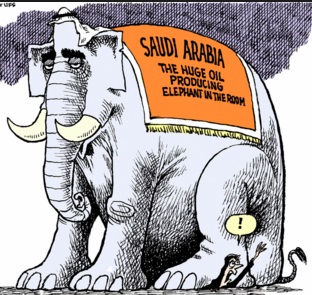Bloomberg reports: Saudi Arabia, one of the most tradition-bound societies on the planet, where family structure and tribal patriarchy differ little from a century ago, is suddenly in a hurry.
Over eight days, it has executed dozens of militants, severed ties with Iran and announced numerous steps for a radical rollback of the state that may include privatizing oil giant Saudi Aramco, among the world’s largest companies.
The flurry of action, a result of tumbling oil prices, shifting U.S. interests and regional turmoil threatening rulers across the Middle East, appears to be the largely the work of Prince Mohammed bin Salman, the 30-something son of King Salman, in office less than a year. And while his ambition to modernize has drawn praise, some fear he is in over his head.
“The Saudis had a reputation of being kind of cautious, secretive,” said Eckart Woertz, a senior researcher at Barcelona Centre for International Affairs. “Right now there are some concerns about rash decisions.”
Prince Mohammed’s announced that an initial public offering in Saudi Aramco may form part of the kingdom’s privatization plans. He called his plans a Thatcherite revolution, like the overhaul of the U.K. economy in the 1980s, saying private investors will be invited to play a bigger role in health care, education and some defense industries; state land will be sold off; and sales taxes introduced on consumer goods.
The new government is rapidly abandoning its old slow style,.The government announced and implemented a cut in fuel subsidies, sending drivers speeding to gas stations and spurring a spate of company statements on how the change would affect them. In November, an annual fee on undeveloped urban land intended to transform the kingdom’s property market was approved by the cabinet after years of talks.
Some of the reforms “bode well for the long-term health of Saudi Arabia, in the sense that they have shown a willingness to cut subsidies, to implement taxes, to cut spending,” said Allison Wood, Middle East and North Africa analyst at Control Risks in Dubai. “But on the other hand, these do increase risks for investors in the sense that they’re often unpredictable and implemented, as we saw, overnight.”
Pressure for change is coming from a budget deficit that reached 15 percent of economic output last year, as oil fell by about two-thirds from mid-2014 levels. Saudi Arabia has dipped into its savings to cover the shortfall — reserves declined for 10 straight months through November, sometimes at an unprecedented pace.
Prince Mohammed came to power with little experience, yet has titles that put him in control of the army, the oil industry and most other areas of the economy. Opening up the economy in the ways proposed by the young prince may be anathema to Saudi conservatives. The kingdom’s clerics enjoy an exalted status in return for their backing against radical Islamists such as al-Qaeda who have challenged the Al Saud family’s legitimacy.

